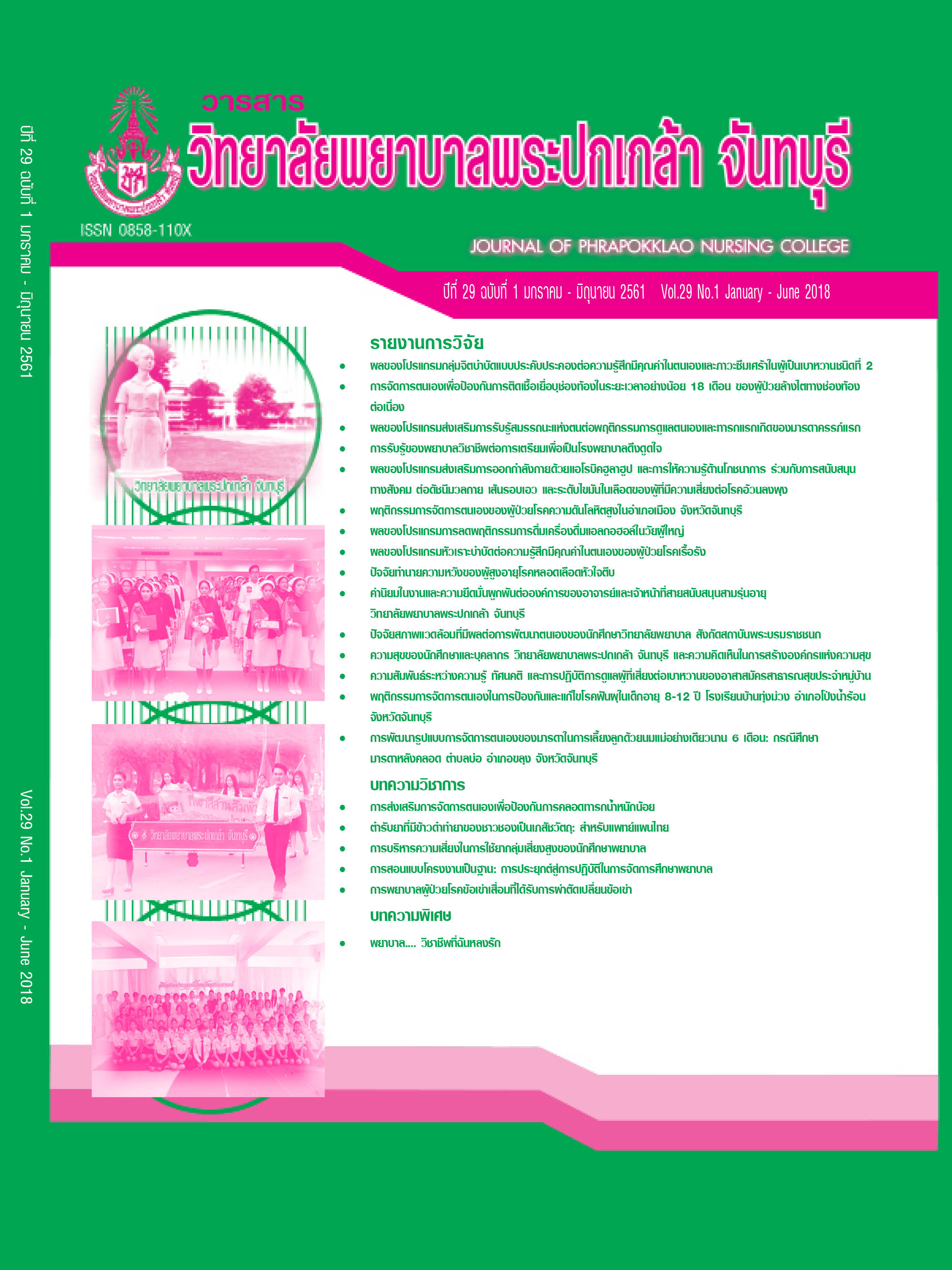The Happiness of Nursing Students and Staffs in Phrapokklao Nursing College and the Opinions for Contributing to the Happy Workplace
Keywords:
Happiness, Nursing students, Staffs, Happy workplaceAbstract
This descriptive research aimed to explore the happiness of the nursing students and staffs including officers and nursing instructors at Phrapokklao Nursing College and their opinions for contributing to the happy workplace. The 645 participants included the student nurses, officers, and nursing instructors of the academic year 2016. Research instruments were the demographic data, the happiness self-assessment questionnaire (the HAPPINOMETER) with the reliability at .89, and the questionnaire of opinions about how to contribute to the happy workplace. Data were collected from September to October 2016. Data were analyzed using frequency, percentage, mean, and standard deviation. The opinions about how to contribute to the happy workplace were analyzed using content analysis by organizing a number of codes into categories and subcategories and then using frequency for ranking.
The research results revealed that the mean score of participants’ happiness was at happy level (X = 73.87, SD = 6.91). The domains with very happy level were the happy body (X = 76.36, SD = 8.92), happy heart (X = 75.88, SD = 8.86), and happy soul (X = 75.88, SD = 13.37); whereas, other domains were at happy level. The factors relating the happiness from participants’ opinion were the personal factors, interpersonal relationship, and the environment. In addition, the opinions regarding how to contribute the happy workplace included: 1) the unity and participation; 2) the teaching and learning strategies; and 3) the residential management, fundamental factors of the human being, and public utilities.
This research suggested that the chief executive of nursing college can use the findings to encourage the happiness among nursing students and staffs by considering their needs and expectations, and the suitable organization and its context.
References
จินดาวรรณ รามทอง. (2558). ความสุขในการทำงานของบุคลากรสายสนับสนุน มหาวิทยาลัยสงขลานครินทร์ วิทยาเขตหาดใหญ่: การวิเคราะห์ปัจจัยเชิงสาเหตุ (วิทยานิพนธ์ปริญญารัฐประศาสนศาสตรมหาบัณฑิต). สงขลา: มหาวิทยาลัยสงขลานครินทร์.
ชุติมา ปัญญาพินิจนุกูร, กลีบแก้ว จันทร์หงษ์, และปรัศนี สมิธ. (2555). การเสริมสร้างความสุขในการทำงานเพื่อส่งเสริมความยึดมั่นผูกพันต่อองค์กรของอาจารย์ในวิทยาลัยพยาบาลบรมราชชนนี กรุงเทพ. วารสารพยาบาลกระทรวงสาธารณสุข, 22(2), 11-23.
บุญญาภา โพธิ์เกษม. (2558). อาจารย์พยาบาลกับความสุขในการทำงาน. วารสารพยาบาลกระทรวงสาธารณสุข, 25(1), 13-24.
บุษกร วัฒนบุตร. (2558). องค์กรแห่งความสุขกับคุณภาพชีวิต. วารสาร มจร สังคมศาสตร์ปริทรรศน์, 4(1), 65-77.
วิจิตรา พูลเพิ่ม, และชลลดา พันธุชิน. (2552). ทักษะชีวิตและการปรับตัวของนักศึกษาวัยรุ่นชั้นปีที่ 1 คณะพยาบาลศาสตร์ มหาวิทยาลัยขอนแก่น. วารสารพยาบาลศาสตร์และสุขภาพ, 32(1), 36-44.
ศิรินันท์ กิตติสุขสถิต, กาญจนา ตั้งชลทิพย์, สุภรต์ จรัสสิทธิ์, เฉลิมพล สายประเสริฐ, พอตา บุนยตีรณะ, และวรรณภา อารีย์. (2555). คู่มือการวัดความสุขด้วยตนเอง (HAPPINOMETER). กรุงเทพฯ: โรงพิมพ์ธรรมดาเพรส. สืบค้น 20 มิถุนายน 2561, จาก file:///C:/Users/Administrator/Downloads/40khuumuuekaarwadkhwaamsukhdwytneng_happinomet.pdf
อมรรัตน์ ศรีคำสุข ไซโตะ, วิภาพร วรหาญ, และวิพร เสนารักษ์. (2554). ความสุขของนักศึกษาพยาบาล หลักสูตรพยาบาลศาสตรบัณฑิต มหาวิทยาลัยขอนแก่น. วารสารพยาบาลศาสตร์และสุขภาพ, 34(2), 70-79.
Burton, J. (2010). WHO Healthy Workplace Framework and Model: Background and supporting literature and practices. Geneva: WHO Headquarters.
Downloads
Published
How to Cite
Issue
Section
License
Copyright (c) 2018 Journal of Phrapokklao Nursing College

This work is licensed under a Creative Commons Attribution-NonCommercial-NoDerivatives 4.0 International License.
เนื้อความ ข้อมูล และรายการอ้างอิงที่ผู้เขียนใช้ในการเขียนบทความเพื่อลงตีพิมพ์ในวารสารวิทยาลัยพยาบาลพระปกเกล้า จันทบุรี ถือเป็นความคิดเห็นและความรับผิดชอบของผู้เขียน คณะผู้จัดทำวารสารไม่จำเป็นต้องเห็นพ้องด้วยหรือร่วมรับผิดชอบ
บทความที่ได้รับการลงตีพิมพ์ในวารสารวิทยาลัยพยาบาลพระปกเกล้า จันทบุรี ถือเป็นลิขสิทธิ์ของวารสารวิทยาลัยพยาบาลพระปกเกล้า จันทบุรี หากหน่วยงานหรือบุคคลใดต้องการนำส่วนหนึ่งหรือทั้งหมดของบทความไปเผยแพร่ต่อเพื่อวัตถุประสงค์ใด ๆ จะต้องได้รับอนุญาตจากบรรณาธิการวารสารก่อน



